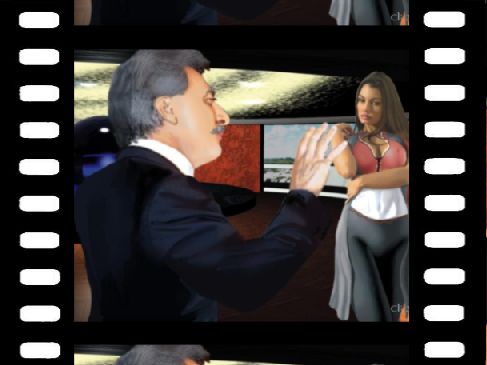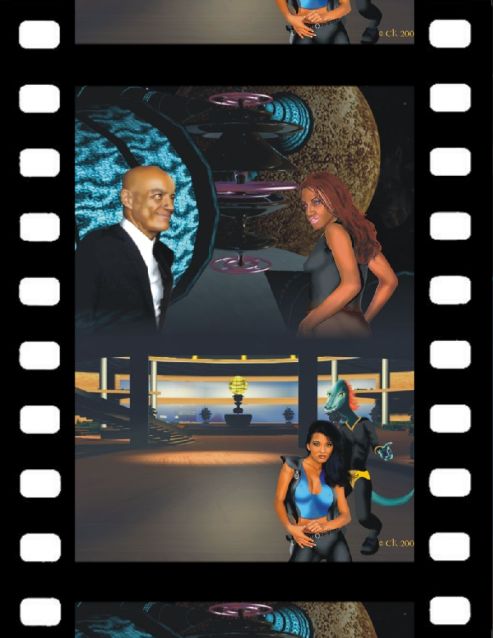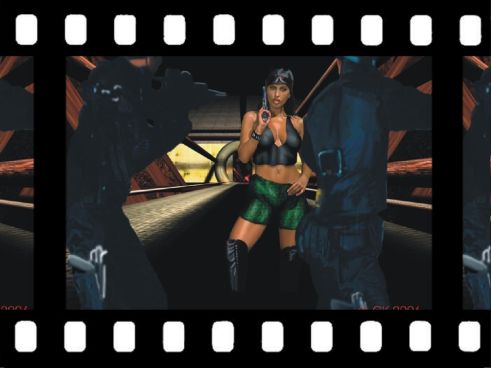

So there I was in fabled Hollywood, having lunch at the Fox Studios. The food was tasty and I was with a movie producer who was interested in a story idea I had pitched. While a professor of physics at the University of California, Irvine, I had published several novels, mostly science fiction. Hollywood, just an hour up the freeway, was a constant temptation. I succumbed to it after three decades of doing intense physics.
We had gone over the whole plot structure, the breakdown into three acts (a Hollywood commandment, Act I ending at 30 minutes and II at 90 minutes in a two hour film)—plus character, logic, setting, the works.
Everything seemed set. Everybody agreed. They thought that the female lead character seemed particularly right, a match of motivation and plot.
Then the producer, a woman in her thirties, leaned across the lunch table and said, "She's just about right, now. Only . . . how about, halfway through, she turns out to be a robot?"
I looked around the dining room, at the murals depicting famous scenes from old movies, at stars in shades dining on their slimming salads in all their Armani finery, at the sweeping view of little purple dots that danced before my eyes because I had neglected breathing after she spoke. "Robot . . . ?"
"Just to keep them guessing," the producer added helpfully. "I want to really suck the juice out of this moment."
"But that makes no sense in this movie."
"It's science fiction, though—"
"So it doesn't have to make sense," I finished for her.
The vast bulk of Hollywood science fiction films brazenly feature flat characters moving through Tinkertoy plots to the regular drumbeat of gaudy spectacles. Horn-rimmed techno-nerds get an occasional smirking nod in passing, on the way to the dazzling special effects payoffs.
This sleep of reason fruitfully births monsters on demand, though—fears of technology, of scientists, and of the future itself. Machines come alive and reflect basic human evils, from Terminators to HAL. Those who sup from the cup of knowledge turn bad—the Invisible Man, Dr. Strangelove, bladerunners galore. Hubris is the drink of choice. In Bride of Frankenstein, mad scientists drink to the toast, "To a new world of gods and monsters!" Nobody hesitates.
The few films in which science fiction sings peer beyond current received wisdom, playing music for the dance between us and our technologies. Machines both help and block our personal relationships, robots come off as terribly human rather than as Gothic horrors, and startling ideas condense into concrete drama.
The big questions before us can often be phrased as If this goes on . . . and What if . . . To get the tone of the issue right, films like Kubrick's 2001 give us crisp, convincing space travel, not the comic book zoom and swirl of a Star Wars. Rather than play upon the easy keys of unease about change, they pull out the stops and embrace it with a realist's love.
As a professor of physics at the University of California, Irvine, I felt the tug of Hollywood brimming at the horizon. I had written some fiction, so my agent began to get calls inquiring whether I could come in, pitch some ideas, schmooze. When the sirens call, who hangs up?
So there I was a few weeks later, talking to a story editor. His development company was interested in making a TV miniseries from my novel, The Martian Race. The whole point of the approach was to portray Mars the way it would really be, hard and gritty and unforgiving. The story editor liked this a "whole lot" and thought it was a "breakthrough concept" and all, but he had his own creative input, too.
"I want a magic moment right here, at the end of the first hour," he said. "Really suck that ol' juice out!"
One of the signatures of H'wood is the incessant use of cliché phrases, the rule of advanced, glance-over-the-shoulder hipitude.
"Magic?" I asked guardedly.
"Something to bring out the wonder of Mars, yeah."
"Like . . ."
"See, when the astronaut is inside this cave—"
"Thermal vent. From an old volcano—"
"Okay, okay, vent it is. In this vent, he's trapped, right?"
"Well, not actually—"
"So he's banged up and he thinks he's going to die and he thinks, what the hell."
"What the hell."
"Right, you get it. He says what the hell, he might as well take his helmet off."
"Helmet. Off."
"Right, you got it. Big moment. Cracks the seal. He smiles and takes a big breath, and says, 'Oxygen! There's oxygen here. Let's take off these helmets!' Whaddaya think?"
"I like the robot better."
That moment expressed Hollywood's basic rule, the Law of Thermodramatics. To get more audience, turn up the gain.
If you absolutely must use scientists as characters, make them odd, nerdy, obsessed, self-important or, even better, quite mad. The Law overwhelms the niceties that scientists would like in movie depictions of them, especially logic or truth.
Pitching a movie or TV project is humbling. Everybody in the room is passing judgment, lounging back on sofas in their H'wood casuals, wearing the baseball caps and jeans Stephen Spielberg made into a uniform. Each got his turn at bat. In my world of scientists, the rule is Everybody has a right to their own opinion, but they don't have a right to their own facts. In Hollywood, I learned, the part after the comma does not apply.
After a few dozen pitch sessions in fashionable '40s-style bungalows, I began to notice that nearly all of these Exec.Prods. and Production Managers and Personal Assistants were under 30,. Most of them came from backgrounds in Film Studies or Journalism, and seemed the types who sit at the very back of their science classes. Some hid behind dark glasses, style victims of hipitude.
I had sold the production team of producer Jon Debont on my novel, Cosm, by bringing along pictures of particle accelerators. High tech, the bigger the better, helps visual people see the movie. They even liked the idea of shooting the film at UC Irvine, where the novel is set. Shooting in the larger LA area keeps costs down. Within a radius that barely included UC Irvine, actors and crew must get themselves to the site every day on their own. Except for the stars, of course.
For Cosm Debont lined up preliminary agreements to star from Dustin Hoffman and Angela Bassett; Time magazine carried this news, to my amazement. I like Hoffman as an actor, and he would play the Einstein-like figure of Max from the novel. The core of the novel was the vexed black woman lead, and I thought Bassett seemed right. Of course, I had no say in any of this, being a mere writer, though I had volunteered those two names in the pitch session.
But then Debont's big project, a film combining sf and westerns titled Ghost Riders in the Sky got axed by Fox because it ran a prelim $115,000,000 shooting budget. They cancelled it mere weeks before the cameras rolled on special effects. Debont had to earn his keep by shooting a horror film based on The Haunting of Hill House, a remake. It did not fare well in critical opinion, though it made some money.
This set him down a notch in the Fame Ladder of H'wood, so even though he had made Twister and Speed he could not get the $90 million needed to go with Cosm. And anyway, the first script, written for a cheapo $150,000, was clearly inadequate. I offered to do one that actually used dialog from the novel, instead of lame technospeak, as the H'wood writer had done, but no, that was impossible—novelists seldom get a shot at the craft of screenwriting. "I'm afraid that puppy's dead, for now," my manager said.
So Cosm is stalled, awaiting cash to finance another screenplay. So is a TV closed-end series I proposed to the SciFi Channel, which took characters clear to the end of the universe and then saved them—too big a budget, some said at several networks. They had a point; showing all of space and time does run up those costs.

I got a good agreement with Mandalay Productions to do The Martian Race as a miniseries, after only one pitch to the CEO. We had tried it on several other companies with various aborted starts, but this looked real. I pitched it with Michael Cassutt, an old TV hand who knows sf and has written a fair amount for magazines and even novels. We based our outline on a story I had written with the biologist Elisabeth Malartre, who was to be the technical advisor.
Then Mandalay started stalling, over and over, going through three drafts of the contracts—wasting nine months while Cassutt and I polished our outlines for the script. They were afraid of the coming big Mars movies, though we could shoot the TV series and have it out before anything reached the theatres. But then somebody came out of left field at us, as well—a small production company that had tried to buy the right the year before.
There it was in the TV schedule: Escape From Mars on UPN. It was the original Malartre-Benford story, wrenched around and with eye-widening technical errors. (They used centrifugal gravity on the way to Mars, as any expedition must, but had the weights on the outside, so the ship was the axis, and would feel no centrifugal effect. It sure looked pretty, though. . . .) Dreadful acting, lousy science—including the obligatory meteorite storm, with pellets smacking into the Martian soil every few meters, like a red hail storm. Sucking the juice from bad astronomy . . .
So we sued. They acted outraged. Lawyers traded shouting phone calls and documents for nine months. Got nowhere. So we told our lawyer to file—and within an hour the Escape From Mars money office gave in. We got a lot more than I would've expected for the TV rights to the novella.
At least it was over . . . or so I thought.
So there I was, having dinner with James Cameron to discuss his TV series, and the parallels between it and my novel, The Martian Race.
Cameron is unlike H'wood types—his lead face conveys that he is earnest and practical and focused. He showed me and Bob Zubrin (the Mars advocate) his study, where for many months he edited Titanic when the world outside was baying for him to release the film. He had plenty of Titanic books around, and told us about how accurate he had tried to make the film. There really had been a clever passenger who stood on the tail as it submerged. He survived, swept upward to the surface by the churn, then finding in the seconds of consciousness remaining a floating table to crawl up onto.
Cameron's sprawling villa in Malibu is chock full of books, mostly sf, and he took us to his favorite Italian restaurant in his Humvee, splashing through streams down an oak-studded canyon; not the usual H'wood type, no.
Like many in H'wood, Cameron subscribes to the neo-auteur theory of film: all must spring from his brow. So he swerved around the huge similarities between his ideas and my novel (already in print), though he couldn't resist talking about scenes that we had in common. "When she makes the run from the collapsed greenhouse, across open ground, without a helmet—wow!"
"Ummm . . . You've got a scene like that?" I asked.
"Well, no." Sudden caution. "But maybe something similar. I need to suck the juice from a moment that's, uh, kinda like that."
There I learned that the usual practice of making people see scenes when pitching a project had a real point. Making a film is really about making scenes, shot sometimes months or even years apart, that get squeezed against each other, chopped, and pureed in the final film. Each must frame against the other, and the transitions in mood must be accomplished in collaboration between the moment of shooting and the moment of truth in the cutting room. Novelists don't come under such pressures, especially not with Exec. Prods. fidgeting daily about the mounting costs.
"I think of myself as a writer, really," he said, well into our second bottle of Borolo, a great Tuscan red.
"So do I," I said blearily.
"Huh? But you are."
"Actually, I have a day job, professor of physics."
"My God, you mean the physics in those novels—" and here he quickly named four, to my amazement—"is true?"
"All physics is metaphor," I said.
Will Cameron's series use much of The Martian Race? I'll have to wait and see, though as they say in H'wood, his people are talking to my people (actually, I only have one—a manager, not an agent). "I think that puppy's dead," my manager says, "but I'll try."
What have I learned? Never expect much, because this is a collaborative biz. Even though the whole thing gets started by a writer having an idea (or, in many cases, purloining one), writers are not seen as primary.
I remember that in the comic strip Peanuts, Snoopy wears a T-shirt saying WHAT I REALLY WANT TO DO IS DIRECT, and the main reason is that's where all the power lies (other than with the money boys, but that's another story). As John Gregory Dunne said, "Wanting to be a screenwriter is like wanting to be a co-pilot."
In the '90s, the biz evolved until style has become content and any schmuck with a viewfinder is an auteur. A few directors have final cut, and so some artistic autonomy, but less than one would think, so they counter by getting into the early creative track, actually writing the script (or maybe just an outline; good dialog is hard). No writer has ever had final draft, unless he was the director, as well—a more prevalent pattern, as the quest for power broadens. The director of Boogie Nights wrote the script for his next, Magnolia, with disastrous results. Cameron both writes and directs.
Making good, big movies depends often on one strong, creative person big enough to defy the grinding media locomotive that wants to run on old, familiar rails. That may be a star, a director or even a producer, but it's damn sure never a writer.
Then there are the "new" creative forces, especially the special effects wizards. When I saw the big feature film Mission to Mars, an excruciating experience, I could tell where the director had thought that the Big Effect Scene was going to save the otherwise clunky script—which reportedly cost two million. It was like a film made by children with money, who could vaguely recall being, like, really turned on by Kubrick and Clarke's 2001. Special effects are often used to cover script problems, by distracting the audience with spectacle. Yeats called this "asking the will to do the work of the imagination." But then, he never got a script into production, right?
An old saw: You can teach technique, but you can't teach talent. Its unseen corollary: Logic and facts don't matter if you can keep the viewer's eyes moving. The Law of Thermodramatics dictates that plot momentum trumps all other suits.
Too many producers and story editors think the larger public cares only for sensation, spectacle, fiery explosions and creepy monsters galore. Plot logic gets trampled along with physical reality. Not that this wasn't often true in old Hollywood. The studio system just plain didn't get the technical accuracy and hard-edged grandeur of 2001. Their idea of a near imitation was Silent Running, a maudlin, sentimental, forgettable epic, which hinged upon nobody's realizing that a space-borne greenhouse would get less sunlight as it cruised out to Saturn.
Hollywood views science fiction as a genre of detachable ideas. That is why so many sf works have their concepts and story structures shoplifted, the serial numbers filed off. Behind this lurks the more insidious notion that writers of short stories and novels don't have screenwriting savvy or skills. Defeating these assumptions will take a lot of effort and some counterexamples, such as the tight collaboration between Arthur C. Clarke and Stanley Kubrick for 2001: A Space Odyssey.
I remember my last conversation with Phillip K. Dick, when he had just returned from seeing the rushes for Blade Runner. He said plaintively, only a few weeks before his death, "I sure wish they'd let me work on some of the dialog."
Perhaps, as technical methods get cheaper, and entertainment more flexible, we can get stories that pay true attention to science. Making abstractions loom large and real is the essential art of an advanced cinema. This means not just shoplifting ideas, as in The Day After Tomorrow's muddled mess of global climate change.

At least some of us would go see actual thinking on the screen. This is far from certain—witness the respectable but not large audience that liked Gattica. Maybe, just maybe, a scrupulous effort to not actually lie to the audience could catch on.
On the other hand, I reflected on that first conversation at Fox Studios. Maybe I should've just nodded, saying, "Sure, make her a robot. When can you cut a check?" And with a deadpan look, "I'd like to suck the juice out of this puppy."
Gregory Benford is the author of many novels and short stories, and has edited a number of anthologies.